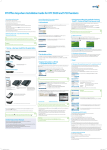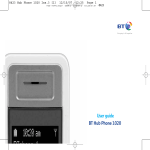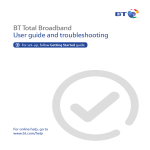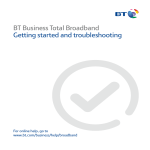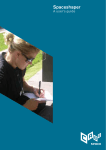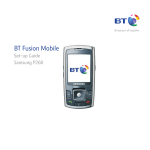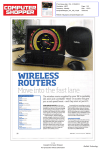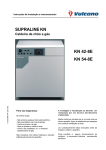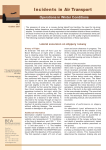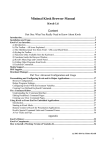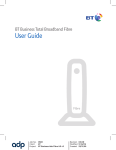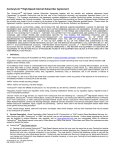Download BT Broadband Network Card User Manual
Transcript
Start here BT Total Broadband Quick Start Offices worldwide The services described in this publication are subject to availability and may be modified from time to time. Services and equipment are supplied subject to British Telecommunications plc’s respective standard conditions of contract. Nothing in this publication forms any part of a contract. © British Telecommunications plc 2008. Registered Office: 81 Newgate Street, London EC1A 7AJ. Registered in England No. 1800000. Item code 044025 / V1.0 Designed by The Art & Design Partnership Ltd. Quick Start Follow these simple steps to set up your BT Home Hub 2.0 1 2 Check your box contents. For more detailed instructions, information and troubleshooting, please see ‘Set up’ on page 9 of your User Guide. 3 Reset to Defaults Fit an ADSL filter to every phone socket that you use in your home. Sockets could be used by telephones, faxes and digital TV boxes (e.g. Sky®). These devices need to use a filter to prevent interference with your broadband service. Using the broadband cable (grey ends), connect your Hub to an ADSL filter and then connect the power supply. Wait for your Hub’s Broadband light to glow blue. This will take a few minutes. 2 Wireless Association Find Handset ADSL filters (x2) 4 BT Total Broadband CD Bringing it all together Compatible with the following operating systems: Microsoft Windows 98SE, ME, 2000, XP and Vista Apple Mac OS 10.2.4 to 10.5.x Power adapter Restart 3 L Filt er PHON E E 1 5 Insert the CD into your computer to continue set-up. AD MOD SL EM C\kÂj^\kjkXik\[ kjkXik\[ C\kÂj^\ Aljkfg\eflkpfliHl`ZbJkXik^l`[\`ek_\gfZb\kfggfj`k\ Xe[]fccfnk_\j`dgc\jk\gjkf^\kfec`e\% gfj`k\ fZb\kfg @ek_`jn\cZfd\gXZbpfln`ccÉe[pfli1 `ek_\g ik^l`[\ \% ec`e Hl`ZbJkXik^l`[\ l`ZbJkX kpfliH k\gjkf^\kf gc\j 9KKfkXc9ifX[YXe[:; Aljkfg\efl nk_\j`d 9KKfkXc9ifX[YXe[Lj\i>l`[\ Xe[]fccf K_\\Xj`\jknXpkf^\kjkXik\[`jn`k_k_\_Xe[pfe\$gX^\Hl`ZbJkXik^l`[\ `eZcl[\[`ek_`jgXZb%Aljk]fccfnk_\j`dgc\jk\gjkf^\kfec`e\%K_\Lj\i>l`[\ Yffbc\kZfekX`ejdfi\[\kX`c\[j\k$lgXe[j\im`Z\`e]fidXk`fe#j_flc[pfle\\[`k% N\ZXej\k`kXcclg]fipfl @]pfl[feÂk]\\cZfeÊ[\ekj\kk`e^lgpfli9K?fd\?lY)%'pflij\c]#n\ ZXe_\cg%=fiXjdXccZ_Xi^\#X9K?fd\@KJlggfik\e^`e\\iZXem`j`kXe[ j\klgpfliYifX[YXe[#9K9ifX[YXe[KXcb#\dX`cXe[j\Zli`kp½Xe[^`m\pfl XYi`\]`ekif[lZk`fekfk_\j\im`Z\% BT Tot CD adband al Bro BT Total Broadband CD :Xcc'/''/.--,+)fi^fkfnnn%Yk%Zfd&_fd\`k`ejkXcc N\Âi\jli\pflÂcc\eafplj`e^9KKfkXc9ifX[YXe[% v1.1.0 Xe[% c9ifX[Y ^9KKfkX eafplj`e i\pflÂcc\ N\Âi\jl AD MOD SL EM Restart Cable cover AD MOD SL EM PHON Find Handset L Filt er ADS Wireless settings card L Fil ter E Wireless Association 2 ADS Ethernet cable (yellow ends) ADS PHON 1 Broadband cable (grey ends) Find Handset You may not need all these items: Wireless Association User Guide and CD Reset to Defaults BT Home Hub Reset to Defaults Restart v1.1.0 Your CD is in your welcome pack BT Total Broadband User Guide Follow Quick Start guide first Contents To install your BT Home Hub, please follow your handy Quick Start guide. This User Guide booklet contains more detailed set-up and service information, including troubleshooting. Learn about… 5 Set-up 9 Your BT Home Hub and BT Total Broadband. Setting up your BT Home Hub, broadband and services. Help 21 Your BT Home Hub 47 Index 58 How to get help, if you need it. Hub lights, buttons and settings. We can set it all up for you For a small charge, a BT Home IT Support engineer can visit and set up your broadband, BT Broadband Talk, email and security – and give you a brief introduction to the service. Call 0800 876 6542* or go to www.bt.com/homeitinstall * Please note: calls to 0800 numbers are free from UK landlines. Mobile costs may vary. See www.bt.com/pricing for details. All calls made to BT or from BT may be recorded to help us give you a better service. 1 Hold tight! Your super-fast broadband is here! Thanks for choosing BT Total Broadband. What’s what For simple, quick broadband set-up, we suggest you use our separate Quick Start guide. Use the guide you’re reading now to find out all about your broadband service, including more detailed set-up and how to get support and advice, should you have any problems. What to do next You can start setting up your BT Home Hub any time, but please bear in mind that if you’re connecting it to a new broadband line, this may not be activated until midnight on your activation day. As you move through the set-up we’ll explain how the Hub shows if your service is active, or whether you need to wait a little longer. What else you need to know Your line needs time to establish its best speed. To make sure you receive the fastest, most reliable service possible on your line, we’ll remotely test it for up to ten days after your broadband is activated. This may occasionally interrupt your service and cause your speed to vary. This is normal, and your speed will settle down after ten days. Please note: if you use an online speed checker to test your broadband speed during these ten days, it may give you an inaccurate and misleading result. If you have any problems, please see Help on page 21. We hope you enjoy your service – have fun! Best wishes, BT Total Broadband team 3 Learn about… Learn about… 6 Learn about… Learn about… Your complete broadband package includes lots of great features to help you get the most out of the internet. Use this section to learn about your service Page BT Home Hub 7 BT Total Broadband features 8 BT Home Hub Your BT Home Hub is a broadband router that can connect computers to the internet using wired or wireless connections. Your Hub can share the broadband service across separate computers and devices (e.g. games consoles) and BT services such as BT Broadband Talk, BT Broadband Anywhere and BT Vision. Learn about… 7 BT Total Broadband Your super-fast BT Total Broadband service includes lots of great features and services, including email, security, great online content and more. Once you’ve set up your Hub and are online, find out about all the great things BT Total Broadband has to offer at www.bt.com/setup/start > More information on BT Broadband – go to www.bt.com/setup/start > Set-up – see page 9 > About your Hub – see page 47 > Help – see page 21 8 Learn about… Set-up Set-up Set-up Getting set up with BT Total Broadband is easy. Simply follow the separate Quick Start guide and CD or use this section for more detailed set-up information. Use this section to get set up and online Page 1 When to start 11 2 Check contents 12 3 Unplug existing modem, router or Hub 13 4 Fit ADSL filters 13 5 Plug in Hub 14 6 Check Hub lights 15 7 Connect computer 15 1 When to start You can start setting up your Hub at any time. But please bear in mind that your new broadband line may not be activated until midnight on your activation day. As you move through this set up we’ll explain how your Hub shows if your service is active, or whether you need to wait a little longer. If you’re moving an existing broadband connection to BT, your existing connection will stop working. When this happens, you can start setting up your Hub. Set-up 11 2 Check contents Open your Hub box and check you’ve everything you need to get started. You may not need to use all the items enclosed to set up your broadband. We’ll explain what you need as you go through this set-up. ADSL filters (x2) ifX[YXe[ 9KKfkXc9 \ Lj\i>l`[ BT Total Broadband CD l`[\Êijk `ZbJkXik^ =fccfnHl Bringing it all together v1.1.0 BT Home Hub User Guide and CD Power adapter You may not need all these items: Broadband cable (grey ends) Ethernet cable (yellow ends) Wireless settings card Cable cover If something you need to use is missing, please call us on 0800 731 0265. 12 Set-up 3 Unplug existing modem, router or Hub If this is your first connection to the internet, please go to step 4. If you already connect to the internet using a modem, router or Hub, it must be unplugged to avoid problems with your new broadband set-up: • if your computer is using a built-in modem: unplug the wire running from your computer to the phone socket • if your computer connects to a separate modem, router or Hub: unplug any wires running from it to your computer, phone socket and mains power. If you already have broadband and ADSL filters attached to your phone lines, you can leave them in place and re-use them with BT Total Broadband. > If you have an existing BT Home Hub, see page 35 > To continue to use your existing broadband modem or router, see page 30 > For information on disposing of electrical equipment, see page 56 4 Fit ADSL filters You need to use ADSL filters to stop your telephone calls interfering with your broadband service. Any devices (telephones, faxes, extension bells, digital set-top boxes (e.g. Sky®) or monitored-alarm systems) that plug into your phone line need filters fitted to them. If you don’t already have filters fitted from a previous broadband connection… At each phone socket that you’re using: 1 unplug the device from the socket ADSL filter 2 plug an ADSL filter into the socket 3 plug the device you just unplugged into the ADSL filter’s phone socket e on Ph SL m AD ode M > For help and examples on fitting filters, see page 36 > If you don’t have enough filters, see page 38 > If you have an ADSL master socket, see page 38 Set-up 13 5 Plug in Hub Your Hub needs to be plugged into mains power and one of the ADSL filters that you fitted in step 4. 1 Plug the broadband cable (grey ends) into the Broadband socket on your Hub and the DSL socket on one of the ADSL filters. 2 Plug the power cable into your Hub’s power socket and a nearby mains power supply and turn on power at the power socket. 2 Reset to Defaults Wireless Association Reset to Defaults Find Handset Restart Wireless Association ADSL PHON E Filter AD MODE SL M Find Handset 1 Restart Please don’t plug in the Ethernet cable (yellow ends) just yet – we’ll tell you when to connect this if you need to. If the broadband cable (grey ends) isn’t long enough to reach one of your ADSL filters, please see ‘Can I use an extension lead to connect my Hub to my phone socket?’ on page 35. 14 Set-up 6 Check Hub lights Wait for your Hub’s Broadband light to glow blue. This will take a few minutes. If the Broadband light isn’t glowing blue after a few minutes, see page 24 7 Connect computer Decide how you’re going to connect your computer to your Hub and choose whether to use the CD or manual set up. Using the CD will help you choose and set-up your connection. I’d like to… Page Connect computer using CD (recommended) 16 Connect computer manually using wireless 16 Connect computer manually using the Ethernet cable 19 > If you don’t have a wireless adapter or your computer isn’t wireless-enabled, see page 40 > If you don’t have an Ethernet port, see page 40 Set-up 15 Connect computer using CD (recommended) Run the CD to help you connect your computer to your Hub and make sure your computer is set up correctly for using BT Total Broadband. If you have more than one computer, run the CD on each one to connect it to your Hub. 1 Insert the CD into the computer that you want to connect to your Hub. C\kÂj^\kjkXik\[ kjkXik\[ C\kÂj^\ Aljkfg\eflkpfliHl`ZbJkXik^l`[\`ek_\gfZb\kfggfj`k\ Xe[]fccfnk_\j`dgc\jk\gjkf^\kfec`e\% k\ kfggfj` _\gfZb\ l`[\`ek \% JkXik^ liHl`Zb kf^\kfec`e k\gj eflkpf Aljkfg\ nk_\j`dgc\j ]fccf @ek_`jn\cZfd\gXZbpfln`ccÉe[pfli1 Hl`ZbJkXik^l`[\ 9KKfkXc9ifX[YXe[:; Xe[ 9KKfkXc9ifX[YXe[Lj\i>l`[\ K_\\Xj`\jknXpkf^\kjkXik\[`jn`k_k_\_Xe[pfe\$gX^\Hl`ZbJkXik^l`[\ `eZcl[\[`ek_`jgXZb%Aljk]fccfnk_\j`dgc\jk\gjkf^\kfec`e\%K_\Lj\i>l`[\ Yffbc\kZfekX`ejdfi\[\kX`c\[j\k$lgXe[j\im`Z\`e]fidXk`fe#j_flc[pfle\\[`k% BT Tot CD adband al Bro BT Total Broadband CD N\ZXej\k`kXcclg]fipfl @]pfl[feÂk]\\cZfeÊ[\ekj\kk`e^lgpfli9K?fd\?lY)%'pflij\c]#n\ ZXe_\cg%=fiXjdXccZ_Xi^\#X9K?fd\@KJlggfik\e^`e\\iZXem`j`kXe[ j\klgpfliYifX[YXe[#9K9ifX[YXe[KXcb#\dX`cXe[j\Zli`kp½Xe[^`m\pfl XYi`\]`ekif[lZk`fekfk_\j\im`Z\% :Xcc'/''/.--,+)fi^fkfnnn%Yk%Zfd&_fd\`k`ejkXcc N\Âi\jli\pflÂcc\eafplj`e^9KKfkXc9ifX[YXe[% v1.1.0 Xe[% c9ifX[Y ^9KKfkX eafplj`e i\pflÂcc\ N\Âi\jl Your CD is in your welcome pack 2 Wait a few moments for the CD to start, follow the on-screen instructions. > If CD doesn’t automatically run, see page 33 > If CD asks you to enter your username and password, see page 34 Connect computer manually using wireless 1 If your computer is already connected to your Hub using an Ethernet cable, unplug this cable. 2 Place your computer close to the Hub for a good wireless signal. 3 If you haven’t already, install your wireless adapter in your computer using the adapter manufacturer’s instructions. If you’re using a laptop with built-in wireless, turn wireless on by either using the wireless switch (if your computer has one) or activating wireless from within your wireless software. Your wireless adapter must be 802.11b, g or n compliant. 16 Set-up > If you don’t have a wireless adapter or your computer isn’t wireless-enabled, see page 40 4 Find your Hub’s preset network name/SSID and wireless key. These are printed on your wireless settings card (found in your Hub’s box) and also on the back of your Hub. Network name / SSID: BTHomeHub2-2345 a2b3c4d5ef Admin password: A1C2E3F4 Wireless PIN: 1234-5678 Your wireless settings card Wireless settings label (on back of Hub) Network name/SSID: Wireless key: Security type: WPA Set-up 17 5 Use your wireless adapter’s software to set up your wireless connection – its help function may be useful if you’re not sure how to do this – or follow the instructions for your computer’s operating system below. Windows XP and Window Vista Mac OS X 1 Go to Start, click Connect To. 1 Click the AirPort status icon in the menu bar. If necessary, turn on AirPort. XP: click Wireless Network Connection. Vista: click Connect to network. 2 Highlight your Hub’s network name (checking the last four digits match your Hub’s details e.g. BTHomeHub2-022B) and click Connect. 3 Type your Hub’s wireless key into the: XP: Network Key box. Vista: Security key or passphrase box. 4 Click Connect and wait a few moments while your computer connects to your Hub. 2 Highlight your Hub’s network name. 3 Mac OS X 10.4 and earlier only: in the Wireless Security box, select WPA Personal. 4 Type your Hub’s wireless key into the Password box. 5 Click OK and wait a few moments while your computer connects to your Hub. > If your computer displays ‘Windows cannot configure this wireless connection’, see page 42 > If your computer’s wireless adapter / software doesn’t have a WPA option, see page 41 6 Open your web browser – you should be on the internet. If you can’t connect to the internet, please restart your computer and try these steps again. > If you still can’t connect, please check your computer’s IP settings are correct (see page 44) or run the CD > If a dial-up window appears, see page 45 18 Set-up 7 Congratulations – you’re now connected to BT Total Broadband using your BT Home Hub. To continue set-up and explore BT Total Broadband’s great features, including security, email, BT Broadband Talk – and more, go to www.bt.com/setup/start To continue set-up, go to www.bt.com/setup/start Connect computer manually using the Ethernet cable 1 Check that your computer has a spare Ethernet port. This is a small socket on the back or side of your computer and is usually marked LAN, Ethernet, or . If you aren’t sure, check your computer documentation. > If you don’t have an Ethernet port, see page 40 2 Plug one end of the Ethernet cable (yellow ends) into one of your Hub’s Ethernet sockets. 3 Plug the other end of the Ethernet cable into your computer’s Ethernet socket. Reset to Defaults Wireless Association Find Handset Restart Set-up 19 4 Open your web browser – you should be on the internet. . If you can’t connect to the internet, please restart your computer and try these steps again. > If you still can’t connect, please check your computer’s IP settings are correct (see page 44) or run the CD > If a dial-up window appears, see page 45 5 Congratulations – you’re now connected to BT Total Broadband using your BT Home Hub. To continue set-up and explore BT Total Broadband’s great features, including security, email, BT Broadband Talk – and more, go to www.bt.com/setup/start To continue set-up, go to www.bt.com/setup/start 20 Set-up Help Help 22 Help Help How to get help – if you need it – including broadband connection and general troubleshooting. Use this section to find help with… Page Connecting to the internet using the BT Home Hub 24 Connecting to the internet using other devices (i.e. not the BT Home Hub) 30 Setting up or using a BT Total Broadband feature 31 Setting up or using a non-BT Total Broadband feature 31 General troubleshooting 32 Help 23 Help with connecting to the internet using the BT Home Hub For example: you can’t browse the internet or send email, and your internet connection’s very slow. What to do… 1 Try restarting Press and release the Restart button on the side of your Hub, and then restart your computer. Restarting fixes most connection problems. 2 Try opening your web browser If you’re connected to your Hub, help information will appear on your screen or BT Broadband Desktop Help will launch. Follow any on-screen help. 3 Check your Hub lights using the table below Section Page Upgrading light is flashing orange A 25 Power light is red B 25 Power light is orange C 25 No lights D 25 Broadband light is flashing orange E 26 Broadband light is red F 27 Broadband light is off G 27 Broadband light is blue H 29 If you don’t use a BT Home Hub, please see page 30. 24 Help A Upgrading light is flashing orange Important – do not turn off or restart your Hub when the Upgrading light is flashing orange. Your Hub’s software is being upgraded remotely. Please wait – it can take up to 30 minutes before your Hub automatically restarts. You won’t be able to connect to broadband until the Broadband light glows blue. B Power light is red If Power light is flashing red, please wait two minutes for your Hub to restart. If it continues to flash red, or is steady red, please call us on 0800 111 4567. C Power light is orange BT Power Save is active. To wake the Hub from power save mode: 1 restart your Hub by pressing and releasing the Restart button on the side of the Hub 2 wait a few minutes for your Hub’s Broadband light to glow steady blue 3 open your web browser on your computer to check you’re connected to the internet For more information on BT Power Save, please see page 54. DNo lights 1 Turn off and unplug Hub power. 2 Check Hub power cable is correctly inserted into the Power socket on the back of the Hub. 3 Check your mains power socket is working. 4 Plug Hub power cable back into mains and turn on. 5 If no Hub lights are on, try resetting the Hub’s default settings. See page 51. 6 Wait a couple of minutes for the Power light to glow blue.If there are still no lights on after above steps, please call us on 0800 111 4567. Help 25 E Broadband light is flashing orange Your Hub is connecting to broadband. Please wait a while. Note for the first 24 hours after set-up After you’ve installed your Hub, it can take up to 24 hours to establish the fastest, most reliable service possible on your line. During this time, the Broadband light may flash orange between periods of steady blue and your broadband service may be interrupted. This is normal. Please leave your Hub connected and switched on and it should settle down after 24 hours. …and the next ten days We’ll also remotely test your line for up to ten days after your broadband is activated. This may occasionally interrupt your service, causing the Broadband light to flash orange. This is normal, and should settle down after ten days. If your Broadband light’s still flashing after 24 hours and you can’t use your broadband service, please try the following: 1 restart your Hub by pressing and releasing the Restart button on the side of the Hub 2 check that any extension sockets you’re using have an ADSL filter fitted (see page 36) 3 if you’re using an extension lead or extension socket, plug the ADSL filter and Hub directly into the main phone socket 4 unplug any other telephone devices (such as telephones, fax machines, digital TV boxes etc.) in your home, leaving only your Hub and its ADSL filter plugged in 5 if the Broadband light is now a steady blue, your Hub is successfully connected to broadband. Connect your computer to your Hub and open your web browser to check you’re connected to the internet. If you still aren’t connected, either your home’s wiring or an ADSL filter may be faulty. Reconnect each ADSL filter and telephone device in turn, checking the Broadband light, to find out if any device is faulty. Also make sure that every device in use is using an ADSL filter 6 if your Broadband light continues to flash, there may be a fault or interference on your line. Please call us on 0800 111 4567 26 Help F Broadband light is red Broadband is active, but your Hub can’t connect to it. 1 Check broadband service status by calling 0800 169 0199. If service is okay, restart your Hub by pressing and releasing the Restart button on the side of the Hub. 2 Wait a couple of minutes until the Broadband light glows blue and open your web browser on your computer to check you’re connected to the internet. 3 If the Broadband light is still red, try resetting the Hub’s default settings – see page 51. 4 If the Broadband light is still red, please call us on 0800 111 4567. Note: if you aren’t a BT Total Broadband customer, a red Broadband light on your Hub could mean your ‘connection’ username and password aren’t configured correctly in your Hub Manager. Check the instructions supplied by your Internet Service Provider for more details. To find out how to access your Hub Manager, see page 53. G Broadband light is off 1 Make sure it’s after midnight on your broadband activation day. If not, please wait until after this time. 2 If it’s after midnight on your broadband activation day, check that the broadband cable (grey ends) is correctly inserted into your Hub’s Broadband socket (grey). 3 Check that the other end of the broadband cable is correctly inserted into the ADSL filter’s DSL socket, and that the ADSL filter is correctly plugged into your phone socket – see diagram on page 36. 4 Plug a phone into the Phone socket on the ADSL filter and listen for a dial tone. 5 Follow the appropriate instructions in this dial tone table on page 28. Help 27 There’s no dial tone: There is a dial tone: 1 try unplugging the filter and plugging your phone directly into the phone socket – if there’s a dial tone this indicates a faulty ADSL filter. Try swapping the filter 1 check broadband service status by calling 0800 169 0199. If service is okay, and you’re using an extension lead or extension socket, plug the ADSL filter and Hub directly into the main phone socket 2 if you’re using an extension socket or extension lead, plug the ADSL filter directly into the main phone socket and listen again If there’s now a dial tone at the main socket, but not at the extension: the extension lead, wiring or socket is faulty. Please call us on 0800 800 151 or contact a qualified engineer for help. You can try connecting your Hub to your main phone socket. If the Broadband light turns blue, your Hub’s now connected to Broadband. Connect you computer to your Hub and open your web browser If there’s no dial tone at the main socket: there’s a problem with your telephone line. Please call us on 0800 800 151 2 unplug any other telephone devices (such as telephones, fax machines, digital TV boxes etc.) in your home, leaving only your Hub and its ADSL filter plugged in If the Broadband light is now a steady blue: either your home’s wiring or an ADSL filter may be faulty. Reconnect each ADSL filter and telephone device in turn, checking the Broadband light, to find out if one is faulty. Also make sure that every telephone device that’s plugged in uses an ADSL filter. If you moved your Hub, try moving it back. When the Broadband light is blue, and your computer is connected to your Hub, open your web browser – you should now be on the internet If the Broadband light is still off: and today is your activation day, please wait until after midnight. If you still have no Broadband light after midnight, please call us on 0800 111 4567 28 Help H Broadband light is blue Your Hub is connected to broadband, but there may be a problem with your computer and/or its connection to the Hub. Try the following: 1 restart your Hub by pressing and releasing the Restart button at the side of the Hub 2 restart your computer 3 wait for your Hub’s Broadband light to turn steady blue 4 open your web browser and follow any on-screen troubleshooting instructions 5aif you’re using an Ethernet cable Check this cable between your Hub and computer is inserted correctly > For more help, follow the manual set-up steps, see page 19 > If you’re connecting to the internet but it’s very slow or unreliable, see page 38 5bif you’re using wireless There are many things that can affect a wireless connection, including settings on your computer, position of your computer and Hub in your home, and interference with the wireless signal. The following tips may help: • check that your computer’s wireless adapter is fitted and/or turned on. Some laptop computers have a small switch – please refer to your computer manual if you need help • check your wireless connection software – it should show if your computer’s connected to your Hub • try moving your computer closer to your Hub • make sure the computer and Hub aren’t close to large electrical appliances • try changing wireless channels, see page 42 > For help setting up a wireless connection, follow the manual set-up steps, see page 16 > If your wireless connection is slow or unreliable, see page 42 6 If either of the above doesn’t solve this problem, please call us on 0800 111 4567 Help 29 Help with connecting to the internet using other devices (i.e. not the BT Home Hub) If you aren’t using a BT Home Hub, please check your equipment’s documentation – there may be a troubleshooting section. Your router’s lights can often also help you identify a problem. The following tips may also help: • make sure all cables are fitted correctly and plugged in securely • make sure you’ve ADSL filters fitted to all the phone sockets on the broadband line • try swapping the ADSL filter your router is plugged into with another, in case the filter is faulty • if you’re using an extension socket, check that it’s working, i.e. plug a phone into the phone socket of the ADSL filter and listen for a dial tone • if you’re using an extension lead or extension socket, try connecting your router to the main socket. If this works, it may mean you’ve a problem with your extension wiring or extension lead • if you’re using wireless, try moving your computer closer to the router • try altering the position of the router aerial (if fitted) • make sure the computer and router aren’t close to large electrical appliances • try changing wireless channels (see your router instructions to find out how to do this) Or, if you have a BT Home Hub available, you could disconnect your existing equipment and try using your BT Home Hub, see page 34 for set-up. 30 Help Setting up or using a BT Total Broadband feature For example: BT email set-up, using BT Broadband Talk, connecting to your Hub using wireless, BT security set-up and more. What to do… Find out what’s included in your BT Total Broadband service and how to set up features such as email, security, your Home Page and web space at www.bt.com/setup/start If you’ve got a specific question, it may have been asked before. Search our frequently asked questions online at www.bt.com/broadband/help If you can’t find what you’re looking for, maybe another BT Total Broadband user can answer your question in our online forum – go to www.bt.com/forums Setting up or using a non-BT Total Broadband feature For example: your own broadband equipment (i.e. you aren’t using a BT Home Hub), a computer, printer, MP3 player, games console, new software package, setting up a new laptop, help with a virus, help connecting additional PCs to your Hub and more. What to do… BT Home IT Support advisors can offer you straightforward, jargon-free help with a wide range of computer-related issues such as printers and camera set-up, over the phone1 or in person2. To find out more, call 0800 876 6542 or go to www.bt.com/homeitsupport 1 £9.99 per month with minimum 3-month subscription or £25 one-off fee for a single call. Some technical queries may not be resolvable. Fair usage policy applies. Exclusions, terms and conditions apply. 2 Engineer visits: costs start from £50. Help 31 General troubleshooting In this section you’ll find some answers to the more common connection problems. If you’re online, see www.bt.com/broadband/help for lots more help and advice. Page My CD won’t run. What should I do? 33 Where can I find my username and password / email? 34 Where can I find my BT Broadband Talk phone number and password? 34 I already have a modem or router, what should I do? 34 I already have a BT Home Hub, what should do? 35 Can I use an extension lead to connect my Hub to my phone socket? 35 Fitting filters – what do I do? 36 I have an ADSL master socket, do I still need to use filters? 38 Can I connect more than one telephone to a filter? 38 What do I do if I don’t have enough ADSL filters? 38 My broadband connection to my Hub is unreliable. What should I do? 38 Why does my broadband speed seem slow? 39 I don’t have an Ethernet port, can I connect to the Hub using a wire? 40 What do I need to use wireless? 40 How can I tell if my computer has built-in wireless? 40 Where can I buy a wireless adapter? 40 Where can I get help with my computer’s wireless? 40 Is my wireless connection secure? 40 More… 32 Help My computer or device does’t work with WPA, can I still use wireless on my Hub? 41 The wireless connection to my Hub is unreliable. What can I do? 42 My computer displays a message ‘Windows cannot configure this wireless connection’ when I try to set up a wireless connection. What can I do? 42 Where can I get some help with general home computing and technology? 43 I’m moving home. What should I do? 43 I’d like to continue to use my existing router. What do I need to do to connect to BT Total Broadband? 43 How do I set my computer to obtain an IP address automatically? 44 What do I do if a dial-up networking window appears when trying to connect to the internet? 45 My CD won’t run. What should I do? PC users: wait 30 seconds, then click on My Computer in the Windows Start menu, then click the CD icon. In the list of files, double-click setup. Mac OS users: double-click the BT Total Broadband desktop icon, then double-click Install.app. If CD still won’t run, follow the steps on page 16 for connecting your computer manually to the Hub. Help 33 Where can I find my username and password / email? Your username and password details were sent to you by email or letter when you ordered the service. Your username is usually [email protected], your password should have been chosen by you. To access your email, either use the BT Yahoo! Mail icon on your desktop or type bt.yahoo.com/webmail into your web browser. You’ll need your username and your password (see above). If you’ve a username but can’t remember your password, you can reset your password. Go to bt.yahoo.com and click ‘Forgot password?’ on the sign-in page. > You don’t need your username or password to connect to BT Total Broadband, but you do need them to access your email and BT Yahoo! Online features > If you can’t find these details, please call us on 0800 111 4567 Where can I find my BT Broadband Talk phone number and password? These details were sent to you by email when you ordered the service. To access your email, either use the BT Yahoo! Mail icon on your desktop or type bt.yahoo.com/webmail into your web browser. If your Hub’s Phone light is blue, you can also find your BT Broadband Talk phone number using Hub Manager. To find out how to access your Hub Manager, please see page 53. For your BT Broadband Talk password please go to www.bt.com/broadbandtalk/youraccount and click on the forgotten password link. If you can’t find your BT Broadband Talk username and password by checking your BT Yahoo! Mail account or Hub Manager please call us on 0800 111 4567. I already have a modem or router, what should I do? Turn it off and unplug it from the mains. Then follow the leads and unplug them from your computer and phone socket. If it’s connected to an ADSL filter, unplug it from the filter. Follow the Quick Start guide or the set-up instructions on page 11. 34 Help If you no longer have a need for old electrical equipment, please dispose of it following your local authority’s recycling advice. For more information, please contact your local authority or the equipment’s seller. I already have a BT Home Hub, what should I do? Unplug it from the mains, then follow the leads and unplug them from your computer (if not using wireless) and ADSL filter. Follow the Quick Start guide or the set-up insrtructions on page 11 to set up your new BT Home Hub and reconnect your computer. • If using wireless, you’ll need to set up your wireless connections again using the security details for your new Hub. The set-up instructions in this guide will show you how to do this. • If you use BT Broadband Talk, your existing talk number should be automatically activated on your Hub shortly after it’s connected to broadband. You’ll know this when the Phone light glows blue. If it doesn’t glow blue within a few hours, you can activate it yourself. Please go to www.bt.com/bbt to find out how to do this. • If you’re using BT Hub Phones, you’ll need to pair these to your new Hub. Please follow the instructions in your BT Hub Phone User Guide. • If you’re a member of BT FON, simply opt-in again using your new Hub. Please go to www.btfon.com • If you’ve received your new Hub as a replacement for a faulty one, please return the faulty Hub using the returns envelope sent with the replacement. Can I use an extension lead to connect my Hub to my phone socket? Yes. We recommend that the extension lead is in good condition and is no longer than ten metres. Using extension leads can affect broadband performance. To find out about using ADSL filters with extension leads, please see ‘Fitting filters – what do I do?’ on page 36. Help 35 Fitting filters – what do I do? Follow the example below that most closely matches your home set-up: 1 One socket 2 More than one socket 3 One socket – phone near socket, extension lead / doubler runs to where computer is 36 Help 4 One socket near computer, extension lead doubler used for phone 5 One socket – extension lead to computer and extension lead to Sky® box Tips • You can connect a phone and Hub to the same ADSL filter. • You can connect two phones to the same ADSL filter if you use a socket doubler. • An ADSL filter should be at one or the other end of an extension lead only, not both. • If you’re using an extension lead for your Hub, the ADSL filter must be fitted at the same end as the Hub. • If you’ve a socket, but there’s nothing plugged in to it, you don’t need an ADSL filter. Help 37 I have an ADSL master socket, do I still need to use filters? No. When you get to Quick Start guide step 3, you’ll simply plug your broadband cable straight into the ADSL master socket’s DSL socket. A broadband (ADSL) main socket looks like this: Can I connect more than one telephone to a filter? Yes. If you use a socket doubler you can connect more than one phone to a single ADSL filter, as shown here. What do I do if I don’t have enough ADSL filters? You can order ADSL filters at www.bt.com/shop and most computer shops or by calling us on 0800 800 150. You can still install broadband even if all devices don’t yet have an ADSL filter, but you must unplug any device without an ADSL filter from its phone socket. You can reconnect the device once you’ve an ADSL filter for it. My broadband connection to my Hub is unreliable. What should I do? If it’s less than ten days since you first connected your Hub to broadband, please wait a little longer. Your line needs time to establish its best speed. To make sure you receive the fastest, most reliable service possible on your line, we’ll remotely test it for up to ten days after your broadband is activated. This may occasionally interrupt your service and cause your speed to vary. This is normal, and your speed will settle down after ten days. 38 Help Please note: if you use an online speed checker to test your broadband speed during these ten days, it may give you an inaccurate and misleading result. If it’s after ten days, please try the following: 1 restart your Hub by pressing and releasing the Restart button on the side of the Hub 2 check that any extension sockets you’re using have an ADSL filter fitted (see page 35) 3 if you’re using an extension lead or extension socket, plug the ADSL filter and Hub directly into the main phone socket 4 unplug any other telephone devices (such as telephones, fax machines, digital TV boxes etc.) in your home, leaving only your Hub and its ADSL filter. This may identify if an unfiltered device or faulty filter is interfering with your broadband line Why does my broadband speed seem slow? The maximum speed your line can support depends on a number of factors, primarily how far you live from your exchange. You can find out more and check the maximum download speed you can expect at www.bt.com/broadband/speedtest To find out more about what can affect your broadband speed, go to www.bt.com/help/broadbandspeed Please note: if you use an online speed checker to test your broadband speed within ten days of joining BT Total Broadband, it may give you an inaccurate and misleading result. Help 39 I don’t have an Ethernet port, can I connect to the Hub using a wire? Your BT Home Hub only accepts Ethernet (wired) or wireless connections. If your computer doesn’t have an Ethernet port, you can add one by buying a USB to Ethernet adapter or, for a desktop computer, a PCI Ethernet card. Contact your computer supplier or high street computer shop, or, if online, you can review the range of adapters available at www.bt.com/shop What do I need to use wireless? Your computer needs to be using a wireless adapter or have built-in wireless functionality. The wireless adapter should be Wi-Fi, 802.11b, g or n compatible. How can I tell if my computer has built-in wireless? If you’re using a laptop purchased within the last year or two, it’s likely to have wireless built in. You need to turn on wireless on some laptops using a switch or option in the software. Check the documentation supplied with the computer. Where can I buy a wireless adapter? These are available at www.bt.com/shop and most computer shops. Check your computer manual to make sure the type of adapter you plan to buy is compatible with your computer. We recommend you get a 802.11n compatible USB wireless adapter, though a 802.11b or g wireless adapter will also work. Where can I get help with my computer’s wireless? Please see your computer or wireless adapter manual. For help with setting up a wireless connection to your Hub, see page 16. Is my wireless connection secure? Your Hub is set with standard WPA security, which helps prevent others accessing your data transfers or connecting to your wireless network. It can also support alternative wireless security options such as WPA2 and Network ID hiding – you can set up these using your Hub Manager. For more information, please go to www.bt.com/broadband/help and type ‘wireless security’ in the search box at the bottom of the page. 40 Help My computer or device doesn’t work with WPA, can I still use wireless on my Hub? It may be possible to upgrade your computer operating system or wireless adapter to support WPA. Refer to the wireless adapter manufacturer’s web site for more information. Or you can configure your Hub to use a less secure WEP wireless key (basic security – less secure than WPA): If you’re connected using wireless, you’ll lose your connection to the internet temporarily when you change your default WEP key. So we recommend that you print or save this page to your computer now. 1 Access Hub Manager by typing bthomehub.home into the address bar of your web browser. 2 Click Settings. 3 Enter your Hub Manager password. 4 In the Basic Setting menu click See or change your wireless security code. 5 Select Use WEP Encryption. 6 Under WEP Wireless Key, type in a new ‘key’ of your choice. This can be any mixture of letters or numbers, up to ten characters. Please don’t enter the default key that came with your Hub. 7 Make a note of your new key and click Apply. 8 Any devices already connected wirelessly to your Hub will be disconnected. To reconnect these, you’ll need to use the new key you’ve just chosen. Follow the instructions provided with the devices or connection software to find out how to do this. You’ll probably need to locate the wireless network connection settings, select your Hub from the list of devices in range, choose to connect to it and enter your new key when asked. > For more information on your Hub Manager, see page 53 > If you need some help, please go to www.bt.com/broadband/help/hub or call 0800 111 4567 Help 41 The wireless connection to my Hub is unreliable. What can I do? We recommend you keep your Hub and computers at least 20 feet away from refrigerators and microwave ovens. Thick walls, metallic surfaces (e.g. mirrors) and other wireless networks can also cause slow or unreliable connections. The distance between your computer and Hub can also affect your wireless connection. When setting up a wireless connection for the first time, try to position your computer close to your Hub, making sure there are no walls or barriers between them. Once a wireless connection has been made, you can move your computer farther away. Your computer or wireless device should indicate the strength of the wireless signal received. If you think your Hub is being affected by interference, try moving it and/or adjusting its aerial position. You can also sometimes improve your wireless signal by refreshing or changing the wireless channel on your Hub. 1 Access Hub Manager by typing bthomehub.home into the address bar of your web browser. 2 Click Settings. 3 Enter your Hub Manager password. 4 In the Basic Setting menu, click Change the wireless channel to avoid interference. 5 Click Refresh. Wait one minute for your device to pick up the new channel. If you’re still experiencing problems, follow steps 1– 4 again and use channel selection to choose an alternative wireless channel then click Apply. Wait one minute for your device to pick up the new channel. > For more information on your Hub Manager, see page 53 > If you need some help, please go to www.bt.com/broadband/help/hub or call 0800 111 4567 My computer displays a message ‘Windows cannot configure this wireless connection’ when I try to set up a wireless connection. What can I do? Your computer’s pre-installed wireless software is preventing you from using the Windows standard wireless software. Find the wireless software on your 42 Help computer by clicking Start then All programs and looking through the list. Once you find this software, you can either use it to set up your wireless connection – its help function may be useful if you’re not sure how to do this – or there may be a tick box that allows Windows to control the wireless set-up. Then follow the instructions on page 16. Where can I get some help with general home computing and technology? BT Home IT Support can give you professional IT support and advice across a wide range of computer and IT devices. For help over the phone or in your home, go to www.bt.com/homeitsupport or call 0800 876 6542. I’m moving home. What should I do? Call us on 0800 800 150, giving at least five days’ notice. Broadband service is subject to availability at your new home. I’d like to continue to use my existing router. What do I need to do connect to BT Total Broadband? We recommend you use the BT Home Hub to get the most out of your BT Total Broadband service. However, if you’re going to be using another type of modem or router, please follow its set-up instructions. You may need the following information: Connection, PPP or username: [email protected] Password: None required1 Encapsulation: PPPoA or PPP over ATM Multiplexing: VC-based or VC Mux VPI/VCI: 0/38 Once you have successfully connected your computer to the internet, you’re ready to continue your set-up and explore BT Total Broadband’s great features, including security, email, BT Broadband Talk – and more. Please go to www.bt.com/setup/start 1 The BT Total Broadband network doesn’t need a connection password. However, some routers do require one. If you’re asked for a password, just enter ‘password’ and confirm, as required. Help 43 How do I set my computer to obtain an IP address automatically? Windows 98SE/Me 1 Go to Start then Settings and click Control Panel 2 Double-click the Network icon Windows 2000/XP/Vista Mac OS X 1 Go to Start and click ‘Control Panel’ then: 2000/XP: click Network Connections 1 Go to the Apple menu, open System Preferences…, then click Network 2 Select TCP/IP Vista: click Network (not OS X 10.5) and Sharing Centre, 3 Under the Configuration then Manage network 3 Select the adapter you tab, select TCP/IP for use to connect to your connections the network adapter router you use to connect to 2 Right-click the icon your Hub 4 In Configure: select the for the network Using DHCP option adapter you use to 4 Click Properties connect to your Hub 5 Click Apply and close 5 Select Obtain an IP the window address automatically 3 Click Properties 6 Click OK twice 4 Select TCP/IP 7 Restart your computer 5 Click Properties 6 Open your web browser 8 Open your web browser 6 Select Obtain an IP address automatically 7 Click OK twice 8 Open your web browser Once you have successfully connected your computer to the internet, you’re ready to continue your set-up and explore BT Total Broadband’s great features, including security, email, BT Broadband Talk – and more. Please go to www.bt.com/setup/start 44 Help What do I do if a dial-up networking window appears when trying to connect to the internet? Windows Mac OS X 1 Go to Start and click Control Panel then click Internet Options 1 Check the IP address using the table above 2 Click the Connections tab 3 Select Never dial a connection 4 Click LAN Settings… 5 Tick Automatically detect settings 6 Click OK twice Once you have successfully connected your computer to the internet, you’re ready to continue your set-up and explore BT Total Broadband’s great features, including security, email, BT Broadband Talk – and more. Please go to www.bt.com/setup/start Help 45 46 Your BT Home Hub Your BT Home Hub Your BT Home Hub 47 48 Your BT Home Hub Your BT Home Hub All you need to know about your Hub’s lights, buttons and settings. Use this section to find out about your Hub Page Hub overview 50 Hub buttons summary 51 Hub lights 52 Hub sockets summary 53 Hub Manager 53 Hub features 54 Your BT Home Hub 49 Hub overview Use the Hub lights to check how the Hub and broadband connection are working – see page 52 Use buttons for restarting Hub and wireless set-up – see pages 51 and 16, respectively Pull this panel off to attach a BT Hub Phone (if ordered) Reset to Defaults Wireless Association Find Handset 50 Your BT Home Hub Restart Use these sockets to set up your Hub – see page 9 Clip on this cover to help keep your cables tidy Hub buttons summary Wireless Association button Sets your Hub to wireless association mode. Press this button and the Phone and Wireless lights flash orange. This button is used to connect a BT Hub Phone to your Hub. Please refer to the BT Hub Phone User Guide for more information. Reset to Defaults button To reset your Hub to its factory default settings, removing all personal settings: 1 press and hold the recessed Reset to Defaults button on the side of your Hub for 2–3 seconds until your Hub lights go out 2 stop pressing and wait for the Hub’s Broadband light to glow blue – this may take several minutes Warning: resetting your Hub means you also have to reset any changes you have made to the Hub software. These changes may include: • Activating BT Broadband Talk – if the Hub’s Phone light is off, go to www.bt.com/bbv and following the instructions • Reactivating BT FON – go to www.btfon.com • Resetting any wireless settings you may have changed • Resetting your Hub password and any Hub Manager changes. See page 53 • Port forwarding settings Restart button Restarting can often solve a broadband connection problem. To restart your Hub, simply press and release the Restart button at the side of the Hub. Restarting also wakes the Hub from BT Power Save – see page 54. Find Handset button Press once to make all handsets that are registered to the Hub ring. Your BT Home Hub 51 Hub lights Here’s a quick summary of what your Hub lights mean… Status Steady blue Hub power on Connected to broadband Flashing orange Hub starting up Connecting to broadband (please wait) Wireless enabled – BT Broadband Talk enabled Connecting to BT Broadband Talk Registering wireless – Hub software upgrading (please wait – this may take up to 30 minutes) Please do not turn off or restart your Hub Steady orange Hub software upgrading (please wait – this may take up to 30 minutes) Confirming broadband service (please wait) (see page 53) Please do not turn off or restart your Hub Flashing red Wireless enabled BT Broadband without security Talk registration Security disabled failed (see page in Hub Manager 34) – Hub in recovery mode Firmware recovery tool is ready to use – Steady red Broadband Hub start-up failed (see page service confirmation 25) failed (see page 27) Off Hub power off 52 Your BT Home Hub – – – – – – BT Broadband Talk isn’t enabled (see page 34) – Broadband line Wireless disabled isn’t detected (see page 27) Hub sockets summary Power socket connects Hub to mains power using the Hub’s power adapter Broadband socket connects Hub to your broadband line via an ADSL filter Ethernet socket connects computers, games consoles or other devices using a wired connection Phone socket connects a standard telephone to your Hub for use with BT Broadband Talk USB socket connects a printer, external storage or other device to Hub (we suggest you keep this socket free for future BT services) > If you don’t have a wireless adapter or your computer isn’t wireless-enabled, see page 40 > If you don’t have an Ethernet port, see page 40 Hub Manager Your Hub is like a computer. It has its own software running, which controls how it works and what it does. You can find technical help and also make changes to the way your Hub works by using the Hub Manager. To access Hub Manager, open your web browser and type bthomehub.home in the address bar. When accessing Hub Manager for the first time, you’ll be prompted to enter the default Admin password from the back of your Hub and then to choose your own admin password. The Hub Manager username is admin. There’s some space in the back of this booklet if you’d like to write down your new password. If you can’t remember your Admin password, you’ll need to reset your Hub to its factory default settings so you can use the default Admin password from the back of your Hub. Please see page 51. Your BT Home Hub 53 Hub features There are many features that your Hub offers although many are advanced and aren’t required in normal day-to-day use. Access Hub Manager and click on Help to find out more. Two key Hub features are described in more detail below. BT Power Save You can save energy when you don’t need your broadband connection, for example, when you’re sleeping. To activate BT Power Save, access your Hub Manager by opening your web browser and typing bthomehub.home in the address bar. You may need a username and password. Click on Configure next to BT Power Save and then choose your settings. When your Hub is saving power, your Hub’s Power light will glow orange and computers and devices using wireless to access the internet or your home network will lose their connections. Any connected BT Hub Phones will still work. BT Access Control Use BT Access Control to set times when your devices can’t connect to the internet. This can be handy, for example, if you’d like to cut back on the amount of time your children are online. To activate BT Access Control, access your Hub Manager by opening your web browser and typing bthomehub.home in the address bar. You may need a username and password. Click on BT Access Control. 54 Your BT Home Hub Notices Bandwidth As you know, with BT Total Broadband and your BT Home Hub you can enjoy adding a number of services to your home network. Add these to all the online activities you may also be doing – such as listening to internet radio, watching online video and downloading files – and you’ll end up with a busy broadband line! Please bear in mind that too many things happening at once over your broadband line may affect the quality of service you receive – this is normal and not a fault with your service. In the unlikely event that this happens to your network, you’ll notice slow downloads and possible small interruptions to phone calls. Simply try to reduce the number of things happening at once over your broadband line. Your service can also be affected if the internet is busy. Warranty We guarantee that the BT Home Hub 2.0 will work to the relevant specification for the minimum period of your agreement* and that it will be free from faulty design, manufacture or materials. If at any time during the minimum period you find that the BT Hub or other equipment is not working properly you may return it to us and we will replace or (at our option) repair it. We will not be responsible for any defects arising from fair wear and tear, accidental or willful damage, misuse or failure to follow our instructions. If you return any equipment as faulty, we may test the equipment – if it is working, we will send it back to you. If we do so, we may charge you our costs for our testing and postage. This does not affect your legal rights relating to equipment which is faulty or wrongly described. Safety and regulatory instructions Please read this document carefully prior to set-up! • Your Hub will get warm once it is connected to the power supply. Although this is normal, you should make sure that your Hub has adequate ventilation to prevent it from overheating. Never block the vents on your Hub. • Don’t expose your Hub to rain, water, moisture or direct sunshine. • Don’t spill liquid on your Hub. • Keep your Hub away from sources of heat such as heaters or radiators. • Don’t attempt to disassemble or open up your Hub yourself. Not only will it make your warranty void, it may expose you to dangerous voltage or other hazards. • Before cleaning, disconnect your Hub from its power supply. Use a damp cloth for cleaning. • For better performance, don’t place your Hub on a television or computer monitor. • In the event of an electrical storm, you must unplug all of your equipment from the electricity supply and phone sockets. * The minimum period will be either 12 or 18 months depending on the Option you choose when you place your order. Notices 55 • This product intentionally generates low-level radio frequency signals and as such, there is a very small risk that this product may interfere with sensitive medical devices, for example a heart pacemaker, when in close proximity. If you have any concerns, BT recommends that you consult the medical device manufacturer before using this product. • The plug on the power cable serves as a disconnect device. Make sure that the power socket you plug the power cable into is easily accessible and located as close to the equipment as possible. Please save energy Please avoid wasting energy while using your computer, games console or other equipment. You can set up your computers to go into standby or low-energy usage mode automatically. Your Hub has BT Power Save – see page 54. Please disconnect your Hub from its power supply when not in use for an extended period (e.g. a holiday), but remember that when you do so all connected computers (and any other devices that use your Hub to connect to your broadband line) will lose internet access and BT Broadband Talk won’t work. Remember to restore power to your Hub before turning your computer(s) on. Product disposal instructions for residential users The Waste of Electrical and Electronic Equipment (WEEE) Directive (2002/96/EC) has been put in place to recycle products using best available recovery and recycling techniques to minimise the impact on the environment, treat any hazardous substances and avoid the increasing landfill. The symbol shown above and on the product means that the product is classed as Electrical or Electronic Equipment and you should not 56 Notices put it into your domestic waste bin. When you have no further use for it, please dispose of the product as per your local authority’s recycling processes. For more information please contact your local authority or the retailer where the product was purchased. Declaration of Conformance Declaration of Conformance with European Community Directive 1999/EC. This product is intended for use within the UK for connection to the public telephone network. This equipment complies with the essential requirements for Radio Equipment and Telecommunications Terminal Equipment Directive 1999/5/EC. The Declaration of Conformance can be found at www.bt.com GNU General Public Licence The BT Home Hub contains code that is covered by the GNU General Public License (GPL). In accordance with the GPL, BT has made the relevant code available for download at: www.btyahoo.com/broadband/adhoc_pages/ gplcode.html Terms and conditions BT Total Broadband and BT Broadband Talk are covered by terms and conditions. To review these, click on ‘Terms and conditions’ at www.bt.com/btbroadband Useful information Useful web site addresses Broadband Life: www.bt.com/broadbandlife Your BT Yahoo! Home Page: bt.yahoo.com Help and support: www.bt.com/broadband/help BT Yahoo! Online help: bt.yahoo.com/help BT Broadband Talk help: www.bt.com/broadbandtalk/help BT Digital Vault: www.bt.com/digitalvault BT Home IT Support: www.bt.com/homeitsupport Your Hub Manager: bthomehub.home Your details BT Total Broadband username: BT Total Broadband password: (Your username and password are also your BT Yahoo! Mail address (email address) and password.) BT Broadband Talk phone number: BT Broadband Talk password: Wireless network name (SSID): Wireless key (WPA): BT Hub Manager username: Preset: admin New: BT Hub Manager password: Preset: admin New: Useful information 57 Index ADSL filters 13, 14, 36-37, 38 Anti-virus 31 Broadband Life 8, 19, 20, 31 Broadband light 26. 27, 28, 29 Broadband speed 3, 39 BT Access Control 54 BT Broadband Talk 31, 34, 51 BT Home IT Support 1, 31, 43 BT Hub Phone 35, 51, 54 BT Power Save 51, 54 Connecting Hub to computer 15–20 Email address 34 Ethernet 12, 19, 29, 40 Extension lead 26, 35, 36, 37 Firmware 52 Help 21, 57 Hub buttons 51 Hub features 54 Hub lights 15, 24, 52 Hub sockets 53 Hub Manager 51 Moving home 43 58 Index Password 1 8, 27, 34, 41–43, 51, 53, 54, 57 Phone light 34, 35, 51 Power light 24, 25 Reset Hub to defaults 51 Restart 24, 51 Security 1, 8, 17, 19, 20, 31, 40, 41, 43, 44, 52 Set-up 9 Troubleshooting 32 Upgrading light 24, 25, 52 USB 40, 53 Useful information 57 Username 27, 34, 43, 54, 57 WEP 41 Wireless 16-19, 29, 40, 42-43 Wireless Association 51 Wireless settings card 12, 17 Wireless channel 42 Wireless light 51–52 WPA 17, 18, 41, 57 Offices worldwide The services described in this publication are subject to availability and may be modified from time to time. Services and equipment are supplied subject to British Telecommunications plc’s respective standard conditions of contract. Nothing in this publication forms any part of a contract. © British Telecommunications plc 2008. Registered Office: 81 Newgate Street, London EC1A 7AJ. Registered in England No. 1800000. Item code 044025 / V1.0 Designed by The Art & Design Partnership Ltd.
































































